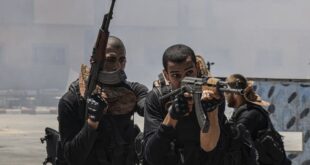 An uneasy calm has returned to the Gaza Strip where Hamas is in full control following a series of attacks on key strongholds of its rival, Fatah.Hamas militants seized the presidential compound in Gaza City overnight after a week of factional fighting, which has left more than 100 people dead.Palestinian Authority President Mahmoud Abbas sacked the Hamas-led government on Thursday and declared an emergency.
An uneasy calm has returned to the Gaza Strip where Hamas is in full control following a series of attacks on key strongholds of its rival, Fatah.Hamas militants seized the presidential compound in Gaza City overnight after a week of factional fighting, which has left more than 100 people dead.Palestinian Authority President Mahmoud Abbas sacked the Hamas-led government on Thursday and declared an emergency.
Mr Abbas is expected to name a caretaker administration within hours.
However, Prime Minister Ismail Haniya, of Hamas, says his government will press on and he will impose decisive law and order.
On Friday, vehicles returned to the roads and shops were open in Gaza. Few armed men were visible on the streets and there were reports of only sporadic gunfire.
The relative calm followed scenes of violence on Thursday as Hamas fighters seized remaining Fatah positions including the headquarters of Fatah’s Preventative Security force and the presidential compound in Gaza City.
Fatah fighters were seen being led away, stripped to the waist, their fate unknown.
Hamas militants in the Gaza Strip said they would release several high-profile Fatah prisoners, including the commander of the elite Presidential Guard, as part of an “amnesty”.
The BBC’s Matthew Price in Jerusalem says the West Bank and Gaza Strip will now effectively be split from one another – Gaza run by Hamas and the West Bank by Fatah.
Mr Haniya has rejected the notion of a separate Gaza state, saying: “The Gaza Strip is an indivisible part of the homeland and its residents are an integral part of the Palestinian people.”
But Mr Abbas said he would now rule by presidential decree until the conditions were right for early elections.
Under the Palestinian Basic Law, essentially the Palestinian constitution, the president can rule by decree for 30 days. This can be extended with the approval of the parliament.
Correspondents say this may be an irrelevance, as Mr Abbas appears to no longer have any influence in Gaza.
There are new fears violence will spread to the West Bank, where Fatah is dominant.
The al-Aqsa Martyrs Brigades, affiliated to Fatah, has called for “martial law”.
During the night, Fatah militants in the West Bank city of Nablus claimed to have killed a Hamas member in retaliation for events in Gaza.
Aid suspended
US President George W Bush said he was “profoundly concerned” over the deepening crisis and called for a halt to the violence.
His Secretary of State Condoleezza Rice gave her backing to Mr Abbas, saying he had exercised his “lawful authority”.
“We fully support him in his decisions to try to end this crisis for the Palestinian people and to give them an opportunity to return to peace and a better future,” she said.
UK Foreign Secretary Margaret Beckett also expressed regret over the dissolution of the government.
“Once again extremists carrying guns have prevented progress against the wishes of the majority who seek a peaceful two-state solution,” she said.
The crisis has also prompted the European Commission to suspend humanitarian aid to the Gaza Strip.
Hamas won a surprise victory in Palestinian elections in early 2006 but has since been engaged in an intermittently violent power struggle with Fatah.
Hamas, an Islamic organisation, rose to prominence in Gaza during two Palestinian uprisings and refuses to recognise or negotiate with Israel.
Fatah, a secular political grouping headed by Mr Abbas, ran the Palestinian Authority until 2006 and officially recognises Israel.
 Eurasia Press & News
Eurasia Press & News
